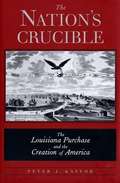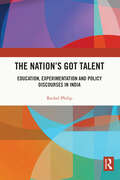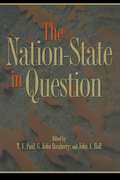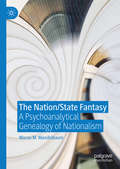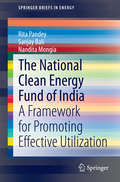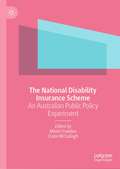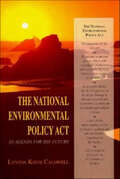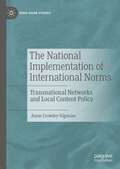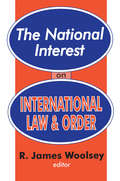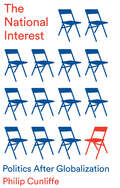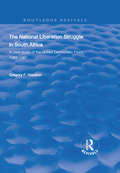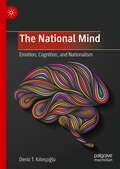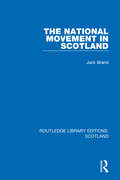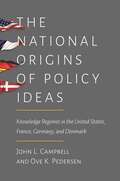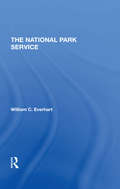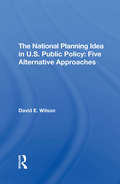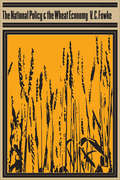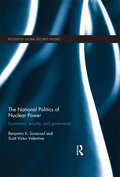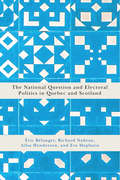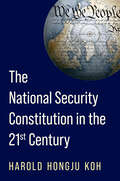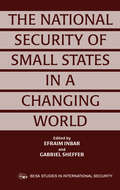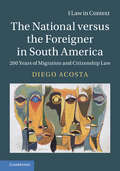- Table View
- List View
The Nation's Crucible: The Louisiana Purchase and the Creation of America
by Peter J. KastorIn 1803 the United States purchased Louisiana from France. This seemingly simple acquisition brought with it an enormous new territory as well as the country's first large population of nonnaturalized Americans--Native Americans, African Americans, and Francophone residents. What would become of those people dominated national affairs in the years that followed. This book chronicles that contentious period from 1803 to 1821, years during which people proposed numerous visions of the future for Louisiana and the United States. The Louisiana Purchase proved to be the crucible of American nationhood, Peter Kastor argues. The incorporation of Louisiana was among the most important tasks for a generation of federal policymakers. It also transformed the way people defined what it meant to be an American.
The Nation's Got Talent: Education, Experimentation and Policy Discourses in India
by Rachel PhilipThis book explores the construction of the idea of the ‘talented’ student in India and its relationship to the discourse of the ‘nation’. It historically situates the evolution of the National Science Talent Search (NSTS) and its subsequent avatar, the National Talent Search Examination (NTSE), with state-sponsored ideas and practices of ‘nation-building’. It also delves into how individuals who wrote and cleared the examination inhabit this identity of the ‘talented’. Drawing on policy documents and institutional literature of over 50 years as well as interviews with past winners of the NSTS/NTSE, including a Nobel laureate, this book is a major intervention in the field of South Asian studies, public policy, and education.
The Nation-State in Question
by T. V. Paul, G. John Ikenberry & John A. HallHas globalization forever undermined the state as the mighty guarantor of public welfare and security? In the 1990s, the prevailing and even hopeful view was that it had. The euphoria did not last long. Today the "return of the state" is increasingly being discussed as a desirable reality. This book is the first to bring together a group of prominent scholars from comparative politics, international relations, and sociology to systematically reassess--through a historical lens that moves beyond the standard focus on the West--state-society relations and state power at the dawn of the twenty-first century. The contributors examine the sources and forms of state power in light of a range of welfare and security needs in order to tell us what states can do today. They assess the extent to which international social forces affect states, and the capacity of states to adapt in specific issue areas. Their striking conclusion is that states have continued to be pivotal in diverse areas such as nationalism, national security, multiculturalism, taxation, and industrial relations. Offering rich insights on the changing contours of state power, The Nation-State in Question will be of interest to social scientists, students, and policymakers alike. John Hall's introduction is followed by chapters by Peter Baldwin, John Campbell, Francesco Duina, Grzegorz Ekiert, Jeffrey Herbst, Christopher Hood, Anatoly Khazanov, Brendan O'Leary, T. V. Paul, Bernard Yack, Rudra Sil, and Minxin Pei. The conclusion is by John Ikenberry.
The Nation/State Fantasy: A Psychoanalytical Genealogy of Nationalism (Palgrave Studies In International Relations Ser.)
by Moran M. MandelbaumThis book explores the origins of nationalism and the ideal of nation/state congruency since early-modern European thought, their transformation over time and endurance in contemporary political thought and IR theory. The author deploys a Lacanian-psychoanalytical reading of nationalism and the nation/state that goes beyond methodological nationalism and state-centrism critiques. He offers a genealogical inquiry into the emergence of the nation/state congruency ideal, thus exposing and problematising the practices that render nationalism and the ideal of the nation/state necessary. Offering a new way to read the ontology and epistemology of the nation/state, this work will be of interest to students and scholars of nations and nationalism, political thought, critical international relations and critical security studies.
The National Clean Energy Fund of India
by Rita Pandey Sanjay Bali Nandita MongiaThe National Clean Energy Fund (NCEF), announced in the Government of India's Budget 2010-11, is seen as a major step in India's quest for energy security and reducing the carbon intensity of energy. Funding research and innovative projects in clean energy technologies, and harnessing renewable energy sources to reduce dependence on fossil fuels constitute the objectives of the NCEF. The NCEF's utilization of funds is considered to be rather low and disbursements poorly aligned with the fund's stated objectives, thus posing a potential risk of diluting the focus of NCEF with adverse implications for the much-needed research and innovation in the clean energy sector in India. The book provides a detailed framework for promoting effective utilization and administration of NCEF. To this effect, it identifies the most promising avenues for utilization of NCEF resources for catalytic opportunities and deployment of new technologies. It also identifies and prioritizes the specific energy sub-sectors towards which the NCEF resources are directed. It also makes suggestions for designing a smart monitoring and evaluation framework for the NCEF. This work provides significant information for the government so that appropriate mid-course corrections may be made in a timely manner. This will also be useful in honing the strategic thinking on a suitable energy-technology policy and an assessment of technology needs and other barriers to the clean energy sector in India.
The National Disability Insurance Scheme: An Australian Public Policy Experiment
by Mhairi Cowden Claire McCullaghThe National Disability Insurance Scheme (known commonly as the NDIS) was introduced as a radical new way of funding disability services in Australia. It is a rare moment in politics and policy making that an idea as revolutionary, ambitious and expensive as the NDIS makes it into its implementation phase. Not surprising, then, that the NDIS has been described by many as the biggest social shift in Australia since Medicare. This book will be a key text for scholars and public policy professionals wishing to understand the NDIS, how it was designed, and lessons learned through its introduction and roll-out. The book addresses how the NDIS has intersected with particular cohorts and sectors, and some of the challenges that have arisen. It highlights the experiences of people with disability through a collection of personal stories from participants and families in the NDIS. The key insights from this large scale public policy experiment are relevant for anyone interested in social change in Australia, or internationally.
The National Environmental Policy Act: An Agenda for the Future
by Lynton Keith Caldwell"The National Environmental Policy Act has grown more, not less, important in the decades since its enactment. No one knows more about NEPA than Lynton Caldwell. And no one has a clearer vision of its relevance to our future. Highly recommended." —David W. Orr, Oberlin CollegeWhat has been achieved since the National Environmental Policy Act was passed in 1969? This book points out where and how NEPA has affected national environmental policy and where and why its intent has been frustrated. The roles of Congress, the President, and the courts in the implementation of NEPA are analyzed. Professor Caldwell also looks at the conflicted state of public opinion regarding the environment and conjectures as to what must be done in order to develop a coherent and sustained policy.
The National Implementation of International Norms: Transnational Networks and Local Content Policy (Euro-Asian Studies)
by Anne Crowley-VigneauThis book explores the domestic adoption and implementation of international norms. The study of normative outcomes is expanded beyond traditional studies of value conflicts and localization to explore how transnational networks and local content policies affect an international norm’s chances of reaching compliance on the ground. Empirical research from two case studies devoted to world class universities and the flaring of Associated Petroleum gas in Russia illustrate how the involvement of ‘Transnational Expertise and Experience Networks’ increases the chances norm implementation will be successful.This book shows how networks help to adapt international norms to a local context by raising awareness and motivation levels, sharing best practices and past experience of implementation. It will be relevant to students, researchers and policymakers interested in international relations and economic transition.
The National Interest on International Law and Order
by R. James WoolseyInternational law and the nature of the global order is regularly examined and debated among specialists. This volume brings together in one place twenty-four articles addressing these subjects, written by some of America's leading academics, lawyers, and policymakers, and originally published in The National Interest, a leading realist journal of international affairs.Prominent jurists, lawyers, and practitioners debate the role that international law should play in the formulation of policy in the first section, and whether 'international law' really exists. Authors explore such questions as the enforceable norms of global behavior, and if American foreign policy should conform to such regulations. A second section looks at the viability and utility of international institutions in advancing U.S. interests. Included are debates over the role and purpose of the United Nations and the International Criminal Court. A third Section deals with the intersection of law enforcement and foreign policy. It explores such questions as whether primary responsibility for combating global terrorism and the international drug trade should be vested with law enforcement agencies or whether it should fall under the purview of foreign policy.The final portion of the book is devoted to the question of human rights, particularly the tripartite debate between Robin Fox, Francis Fukuyama, and William F. Schulz over the nature and origins of human rights. Among the questions considered are whether human rights are an outgrowth of natural law, or are natural imperatives at odds with protecting individual dignities and freedoms. Is there a universal standard of rights, or are human rights norms derived from majority consensus?The list of distinguished contributors to this volume include John Bolton, Robert Bork, Lee Casey, Douglas Feith, Owen Harries, Senator Jesse Helms, Alan Keyes, Irving Kristol, Joseph Nye, Jeremy Rabkin, David Rivkin, Alfred P. Rubin, and Abrahama Sofaer. This volume will be of interest to legal scholars, political scientists, and students of diplomacy and international relations.
The National Interest: Politics After Globalization
by Philip CunliffeGlobalization is over. With US president Donald Trump pursuing an ‘America First’ agenda in trade and foreign policy, everyone now recognises the urgency of defending their own country’s national interest. But what is the national interest and why did it disappear from the political agenda? Will Trump restore American national interests, or will he betray them? How might we know the difference? The National Interest answers these questions. It explains how and why globalist political leaders and bureaucrats abandoned the national interest over the past thirty years. Even today, many of our elites still sneer at the concept as an anachronism in an age of global environmental collapse and ‘polycrisis’. But without it, there can be no political representation, and without representation there can be no democratic accountability. The national interest can be revived as part of a strategy of nation-building and national rebirth. This book makes the case for such a revival, heralding a new era of democratic renewal and international cooperation.
The National Liberation Struggle in South Africa: A Case Study of the United Democratic Front, 1983-87 (Routledge Revivals)
by Gregory F. HoustonFirst published in 1999, this volume follows the interactions between the United Democratic Front (UDF) and the African National Congress (ANC) and Pan Africanist Congress (PAC), which had adopted more revolutionary strategies after their banning in 1960, over the period 1983-87. Only a few studies of the UDF have aimed to link revolutionary developments in 1980s South Africa with theories of revolutionary strategy and tactics. This volume focuses on the relation between revolutionary theory, praxis and the formation, aims, policies and practices of the UDF. Houston argues that the formulation of the UDF met certain strategic and tactical requirement of Lenin and Gramsci’s theories of revolutionary strategy, repositioning the UDF as becoming a Leninist vanguard party, with its affiliate membership operating largely underground. The volume features 6 detailed maps of the Cape Town area, the Republic of South Africa in the 1980s, the Johannesburg area, the Durban area, the Pretoria area and the Northern Transvaal.
The National Mind: Emotion, Cognition, and Nationalism
by Deniz T. KılınçoğluThe National Mind argues that understanding the power of nationalism requires probing into its cognitive and emotional influence on our everyday perceptions, feelings, beliefs, and behavior. Focusing particularly on the impact of canonical national narratives on thinking and feeling norms in society, it develops an interdisciplinary cognitive approach to the question of how nationalism shapes our minds, and eventually, our world. It derives insights from longstanding philosophical and scholarly debates on the social nature of knowledge and feeling as well as recent cognitive research on emotions and the perception of reality. Grounding its theoretical investigation in empirical observations about a prominent non-Western case, namely, contemporary Turkey, The National Mind demonstrates how nationalist narratives and conceptions dominate our social and political common sense, at both societal and global levels. It offers a comprehensive and original interpretation of how the ‘national mind’ operates in everyday experiences. This groundbreaking book will appeal to students and scholars of psychology, philosophy, politics, history, sociology, and nationalism studies.
The National Movement in Scotland (Routledge Library Editions: Scotland #2)
by Jack BrandOriginally published in 1978, but now re-issued with a new Preface by James Mitchell, this volume traces the rise of the SNP, with special emphasis on explaining the increase of the National Party vote in Scotland from the early 1960s to the late 1970s. The book draws much of its information from interviews with members and ex-members of the SNP, including some who helped to found the party in 1928. In describing the movement and giving an account of its main features, the author begins with a discussion of various aspects of Scottish society which have contributed to the growth of nationalism. These include the political developments of the Labour movement, the economic history of 20th Century Scotland the development of youth culture and in particular, the interest in folk music, as well as developments in the Church, the army, and the press.
The National Origins of Policy Ideas: Knowledge Regimes in the United States, France, Germany, and Denmark
by John L. Campbell Ove K. PedersenIn politics, ideas matter. They provide the foundation for economic policymaking, which in turn shapes what is possible in domestic and international politics. Yet until now, little attention has been paid to how these ideas are produced and disseminated, and how this process varies between countries. The National Origins of Policy Ideas provides the first comparative analysis of how "knowledge regimes"—communities of policy research organizations like think tanks, political party foundations, ad hoc commissions, and state research offices, and the institutions that govern them—generate ideas and communicate them to policymakers.John Campbell and Ove Pedersen examine how knowledge regimes are organized, operate, and have changed over the last thirty years in the United States, France, Germany, and Denmark. They show how there are persistent national differences in how policy ideas are produced. Some countries do so in contentious, politically partisan ways, while others are cooperative and consensus oriented. They find that while knowledge regimes have adopted some common practices since the 1970s, tendencies toward convergence have been limited and outcomes have been heavily shaped by national contexts.Drawing on extensive interviews with top officials at leading policy research organizations, this book demonstrates why knowledge regimes are as important to capitalism as the state and the firm, and sheds new light on debates about the effects of globalization, the rise of neoliberalism, and the orientation of comparative political economy in political science and sociology.
The National Park Service: The Story Behind The Scenery (The\story Behind The Scenery Ser.)
by William EverhartSince the first edition of this book was published ten years ago, the U.S. national park system has more than doubled in size, and the National Park Service (NPS) has been subjected to more political manipulation than at any time since the agency was established in 1916. Before 1972, no NPS director had ever been removed for political reasons; sinc
The National Planning Idea In U.s. Public Policy: Five Alternative Approaches
by David E WilsonThis book explores the eventful but largely forgotten history of national planning efforts in the United States, first identifying and comparing five alternative approaches to contemporary national planning, then using these approaches to assess the events of 1973-1976, a period when crisis pressures brought a vigorous resurgence of national planning activity and debate. Dr. Wilson concludes that two new approaches to planning— "learning-adaptive" and general systems—are increasingly being used in lieu of the long-established, and less flexible, rational and incremental approaches, and that these might eventually achieve a beneficial new synthesis in both federal policy practice and social science theory. He argues that the twin questions of a planned versus a planning society and of who will plan for whom are inexorably emerging as key issues in U.S. public policy. Along with its companion volume—National Planning in the United States: An Annotated Bibliography, also published by Westview—this book provides extensive new interdisciplinary research material and integrative perspectives on current planning challenges.
The National Policy and the Wheat Economy
by Vernon FowkeFirst published in 1957, this study traces the development of the national policy as it affected the growth of the Canadian trade and discusses the grain marketing problems of Western Canada in the decades that followed, with detailed attention to legislation and moves by various growers' groups in an attempt to meet these problems. This important study in political economy is organized into four main parts. In Part One the author traces the development of the national policy and its impact on the growth of the wheat empire in the years before 1900. In Part Two, he discusses the grain marketing problems of western Canada during the 1900-1920 period. Part Three is a masterful exposé of the history of the open market system and of the history and policies of the Canadian Wheat Pools, and Part Four examines the economic philosophy behind the development of the national policy.
The National Politics of Nuclear Power: Economics, Security, and Governance (Routledge Global Security Studies)
by Benjamin K. Sovacool Scott Victor ValentineThis book offers a comprehensive assessment of the dynamics driving, and constraining, nuclear power development in Asia, Europe and North America, providing detailed comparative analysis. The book formulates a theory of nuclear socio-political economy which highlights six factors necessary for embarking on nuclear power programs: (1) national security and secrecy, (2) technocratic ideology, (3) economic interventionism, (4) a centrally coordinated energy stakeholder network, (5) subordination of opposition to political authority, and (6) social peripheralization. The book validates this theory by confirming the presence of these six drivers during the initial nuclear power developmental periods in eight countries: the United States, France, Japan, Russia (the former Soviet Union), South Korea, Canada, China, and India. The authors then apply this framework as a predictive tool to evaluate contemporary nuclear power trends. They discuss what this theory means for developed and developing countries which exhibit the potential for nuclear development on a major scale, and examine how the new "renaissance" of nuclear power may affect the promotion of renewable energy, global energy security, and development policy as a whole. The volume also assesses the influence of climate change and the recent nuclear accident in Fukushima, Japan, on the nuclear power industry’s trajectory. This book will be of interest to students of energy policy and security, nuclear proliferation, international security, global governance and IR in general.
The National Question and Electoral Politics in Quebec and Scotland (Democracy, Diversity, and Citizen Engagement Series #3)
by Ailsa Henderson Richard Nadeau Éric Bélanger Eve HepburnIn Quebec and Scotland, questions of constitutional change, national identity, and national grievance play an important role in the electoral calculations of political parties and voters. Taking a strong stance on the national question can have strategic benefits both for parties pushing for greater autonomy and for those endorsing the status quo. In this in-depth look at issue voting, authors Éric Bélanger, Richard Nadeau, Ailsa Henderson, and Eve Hepburn examine how the national question affects political parties and voter behaviour in both substate nations. Through party manifestos, interviews with legislators, and opinion survey data, this book demonstrates that calls for constitutional change influence political debate, competition, voter choice, and the outcome of elections not only within Quebec and Scotland but also across Canada and the United Kingdom. Minority nationalist parties, the authors show, can gain support by claiming ownership of issues with widespread public agreement, such as self-determination and protecting the identity and interests of the nation. A comprehensive analysis of recent electoral politics, The National Question and Electoral Politics in Quebec and Scotland greatly enhances our understanding of the electoral impact of substate nationalism.
The National Question in Yugoslavia: Origins, History, Politics
by Ivo BanacEven before it collapsed into civil war, ethnic cleansing, and dissolution, Yugoslavia was an archetypical example of a troubled multinational mosaic, a state without a single national base or even a majority. Its stability and very existence were challenged repeatedly by the tension between the pressures for overarching political cohesion and the defense of separate national identities and aspirations. In a brilliant analysis of this complex and sensitive national question, Ivo Banac provides a comprehensive introduction to Yugoslav political history. His book is a genetic study of the ideas, circumstances, and events that shaped the pattern of relations among the nationalities of Yugoslavia. It traces and analyzes the history and characteristics of South Slavic national ideologies, connects these trends with Yugoslavia's flawed unification in 1918, and ends with the fatal adoption of the centralist system in 1921. Banac focuses on the first two and a half years in the history of the Kingdom of the Serbs, Croats, and Slovenes, because in his view this was the period that set the pattern for subsequent development of the national question. The issues that divided the South Slavs, and that still divide them today, took on definite form during that time, he maintains. Banac provides extensive treatment of all of Yugoslavia's nationalities; his sections on the Montenegrins, Albanians, Macedonians, and Bosnian Muslims are unique in the literature. In this unbiased account, all of the principals and groups assume a tragic fascination. When published in 1984, The National Question in Yugoslavia was the first complete introduction to the cultural history of the South Slavic peoples and to the politics of Yugoslavia, and it remains a major contribution to the scholarship on modern European nationalism and the stability of multinational states.
The National Security Constitution in the Twenty-First Century
by Harold Hongju KohA deeply researched, fully updated edition of The National Security Constitution that explores the growing imbalance of institutional powers in American foreign affairs and national security policy Since the beginning of the American Republic, a package of norms has evolved in the U.S. Constitution to protect the operation of checks and balances in national security policy. This &“National Security Constitution&” promotes shared powers and balanced institutional participation in foreign policymaking. Today it is under attack from a competing claim of executive unilateralism generated by recurrent patterns of presidential activism, congressional passivity, and judicial tolerance. This dynamic has pushed presidents of both parties to press the limits of law in foreign affairs. In his award-winning National Security Constitution (1990), Harold Hongju Koh traced the evolution of this constitutional struggle across America&’s history. This new book, based on the earlier volume but with roughly 70 percent new material, brings the story to the present, placing recent events into constitutional perspective. Reviewing the presidencies of the twenty-first century, he explains why modern national security threats have given presidents of both parties incentives to monopolize foreign policy decision-making, Congress incentives to defer, and the courts reasons to rubber-stamp. Koh suggests both a workable strategy and crucial prescriptions to restore the balance of our constitutional order in addressing modern global crises.
The National Security Enterprise: Navigating The Labyrinth
by Dina Temple-Raston Roger Z. George Thomas Fingar Marc Grossman Colton C. Campbell David P. Auerswald Michael Warner Gordon Adams John Diamond Michael J. Meese Isaiah Wilson Harvey Rishikof Jon J. Rosenwasser Rodney Bent Kathy Peroff Desaix Myers Franklin C. Miller Joseph McMillan Brittany Albaugh Susan Ginsburg Gerald Felix Warburg Ellen LaipsonThis second edition of The National Security Enterprise provides practitioners' insights into the operation, missions, and organizational cultures of the principal national security agencies and other institutions that shape the US national security decision-making process. Unlike some textbooks on American foreign policy, it offers analysis from insiders who have worked at the National Security Council, the State and Defense Departments, the intelligence community, and the other critical government entities. The book explains how organizational missions and cultures create the labyrinth in which a coherent national security policy must be fashioned. Understanding and appreciating these organizations and their cultures is essential for formulating and implementing it. Taking into account the changes introduced by the Obama administration, the second edition includes four new or entirely revised chapters (Congress, Department of Homeland Security, Treasury, and USAID) and updates to the text throughout. It covers changes instituted since the first edition was published in 2011, implications of the government campaign to prosecute leaks, and lessons learned from more than a decade of war in Afghanistan and Iraq. This up-to-date book will appeal to students of US national security and foreign policy as well as career policymakers.
The National Security of Small States in a Changing World (Frcass/besa Ser.)
by Gabriel Sheffer Efraim InbarThe first part of this book is primarily devoted to analysing the impact of the system of international relations on the fortunes of small states. The second part discusses the question 'what changes in the national strategy of small states are necessary in view of the new international system?' The authors of this volume come from various parts of the world and espouse differing outlooks. Nevertheless, they were able to coalesce around a similar theme in an effort to contribute to the international understanding of the special challenges that confront the world's small states.
The National Security: Its Theory and Practice, 1945-1960
by Norman A. GraebnerBased on a conference at West Point, this volume explores the national security policies developed by the Truman and Eisenhower administrations in response to the threat of Soviet expansionism. More pointed and analytic than any other book on the subject, it shows clearly that the makers of Cold War policy were motivated by fear. It also examines the nature of U. S. security policy and points to the growing gap between the ends and the means of global security policy--the goal of protecting Western democracy from the "Red Menace" by using a nuclear strategy with limited applications. The contributors, including David Alan Rosenberg, Lloyd C. Gardner, Martin J. Sherwin, and Gary W. Reichard explore such issues as how dependence on nuclear weapons became the central doctrine of American foreign policy, the bureaucratic and political context of U. S. security, Eisenhower's ongoing disputes with Army and Navy leaders over the security issue, the objections of Democrats to the evolving security strategy, and the limits of Cold War policy, particularly how the viewing of the Third World through a U. S. -Soviet prism impeded us from developing a truly global security policy. Written in an accessible, journalistic style, The National Security makes available a wealth of information on the Cold War period and offers insights into fears that dominate political thinking to this day.
The National versus the Foreigner in South America: 200 Years of Migration and Citizenship Law (Law in Context )
by Diego AcostaSince the turn of the century, South American governments and regional organisations have adopted the world's most open discourse on migration and citizenship. At a time when restrictive choices were becoming increasingly predominant around the world, South American policymakers presented their discourse as being both an innovative and exceptional 'new paradigm' and part of a morally superior, avant-garde path in policymaking. <P><P>This book provides a critical examination of the South American legal framework through a historical and comparative analysis. Diego Acosta uses this analysis to assess whether the laws are truly innovative and exceptional, as well as evaluating their feasibility, strengths and weaknesses. By analysing the legal construction of the national and the foreigner in ten South American countries during the last two centuries, he demonstrates how different citizenship and migration laws have functioned, as well as showing why states have opted for certain regulation choices, and the consequence of these choices for state- and nation-building in the continent. An invaluable insight for anyone interested in global migration and citizenship discussions.<P> Offers in depth coverage and critical analysis of the present legal regulations of migration and citizenship law.<P> Discusses the extremely interesting principles behind South American migration and citizenship laws, including universal citizenship, the non-criminalisation of irregular migration, and the right to migrate as fundamental.<P> Features analysis of ten South American countries across two centuries which uncovers wider transnational trends and legal mechanisms.<P>
